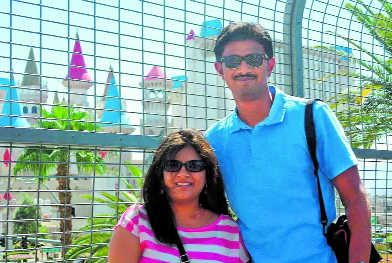Do we belong here?” This question by Sunayana, the wife of Indian engineer Srinivas Kuchibhotla gunned down at a Kansas bar, sums up the angst of many Indians living in the United States. “I appeal to the parents of Telugu families not to send their children to America. It is not a safe place anymore,” said M Jaganmohan Reddy, father of Alok Madasani who was injured in the shooting. Both Srinivas and Alok are from Hyderabad and were employed at Garmin International, a GPS navigation and communications company.
What makes Telugus particularly vulnerable to racial attacks? Over the last two decades, the Telugus have come to dominate the technology sector and constitute one of the highly successful ethnic communities in America. More than six lakh Telugus are estimated to be living in the US. Many youngsters are pursuing advanced degrees and have become successful software professionals, engineers, doctors and business managers. Twelve Telugus were killed in the last three years, a majority of them related to hate crime and road rage.
“While we may not be able to totally prevent such attacks, we should try not to expose ourselves to those circumstances where we will be vulnerable,” says Parmesh Bheemreddy, president-elect of the American Telugu Association (ATA). Between 2008 and 2012, Hyderabad had sent over 26,000 students to the US, a majority of them pursuing science, technology, engineering, or mathematics (STEM) degrees. The lure of quality higher education and high-paying jobs draws young Telugus to the US.
The migration of Telugus to the US picked up momentum in the 1990s when technology sector presented immense opportunities. The technology boom, aided by global race to tackle Y2K problem, provided an ideal platform for young engineers from Andhra Pradesh to migrate in search of greener pastures. Microsoft CEO Satya Nadella is now a role model for the Telugu youth. He had his schooling in Hyderabad and migrated to America after obtaining Engineering degree from Manipal University. Adobe CEO Shantanu Narayan is another high-profile Hyderabadi who did his Engineering degree from Osmania University.
Following the Kansas shooting, the Telangana America Telugu Association (TATA) has issued a set of 'dos and don'ts' to its members. It asked them not to speak in their mother tongue in public places and not to flaunt their wealth and expensive vehicles as it would draw attention to their position and earnings. Incidentally, Telugus are among the high earning income brackets in the US.
Many Telugus who have made America their home feel that their future is uncertain due to imminent restrictions on the H1-B programme. Is it the end of the Great American Dream for Indian techies?
“I have waited for onsite assignment for several years. That dream may not come true now. My company may not send me to the US in view of the changed atmosphere,” said Anil Kumar, a software engineer working for a leading IT solutions company in Hyderabad. There are thousands of Indian engineers like him who are more than willing to work for a low salary, if they get to work in America under H-1B. It is seen as a passport to a dream life in the Land of Opportunities. The Kansas victim and his colleague were on H1-B visa.
Unlock Exclusive Insights with The Tribune Premium
Take your experience further with Premium access.
Thought-provoking Opinions, Expert Analysis, In-depth Insights and other Member Only Benefits
Already a Member? Sign In Now










